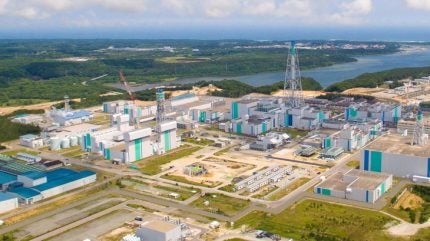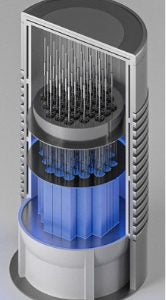
Japan Nuclear Fuel Limited (JNFL), the operator of Japan’s first commercial nuclear fuel plant, currently under construction in Rokkasho, Aomori Prefecture, has again postponed its completion by two years. JNFL now expects the reprocessing plant and mixed-oxide (MOX) fuel plant to be completed during fiscal years 2026 and 2027, respectively. Once operational, the maximum reprocessing capacity of the Rokkasho plant will be 800 tonnes a year, according to JNFL.
A two-year delay was previously announced in 2020. JNFL had aimed to complete construction in the first half of fiscal year 2022, but the company notified Aomori Prefecture that the schedule had been extended to the first half of fiscal year 2024. This was the seventh recent postponement of the facility’s projected completion date.
JNFL President Naohiro Masuda told a press conference: “We have been working on the review of the construction approval, construction and inspection, aiming to complete the reprocessing plant ‘as early as possible in the first half of fiscal year 2024’ and the MOX fuel plant ‘in the first half of fiscal year 2024’. However, because the review is taking time, we have set the new completion target as ‘during fiscal year 2026’ for the reprocessing plant and ‘during fiscal year 2027’ for the MOX fuel plant.”
He said the governor of Aomori Prefecture and the mayor of Rokkasho Village had been informed and had expressed concerns about further delays. “We sincerely apologise for causing concern and inconvenience to the people of Aomori Prefecture and Rokkasho Village due to the repeated review of the completion target,” Masuda said. “We will take the governor and mayor’s words to heart and work hard toward the new completion target.”
Kingo Hayashi, Chairman of the Federation of Electric Power Companies, said: “We believe that the new completion target has been set as a result of clarifying the issues in the construction approval review and uncovering problems including construction and inspection, with the cooperation of supporters from the electric power companies…. Nuclear power generation will need to continue to be an important source of power, and the nuclear fuel cycle is extremely important from the perspective of making effective use of uranium resources, reducing the volume and harmfulness of waste, etc.”
Construction of a reprocessing plant at Rokkasho, which began in 1993, was originally scheduled for completion in 1997, while construction of the 130-tonne-a-year MOX plant began in late 2010 – delayed by three years from the planned 2007 start following revision of seismic criteria in the wake of the Niigata-Chuetsu-Oki earthquake. Until 1998, Japan had sent most of its used fuel to France and the UK for reprocessing and MOX fabrication but in 1999 began storing it to supply the Rokkasho facilities.
Japan’s MOX fuel policy originally assumed the use of fast breeder reactors (FBRs) but technical problems have led to its FBRs to be closed and plans for a new design are unclear. As a result plutonium stored in used fuel held by Japanese NPPs has increased to some 46 tonnes.






